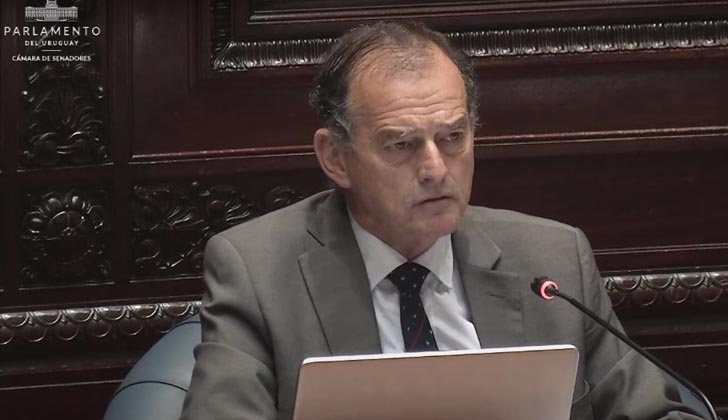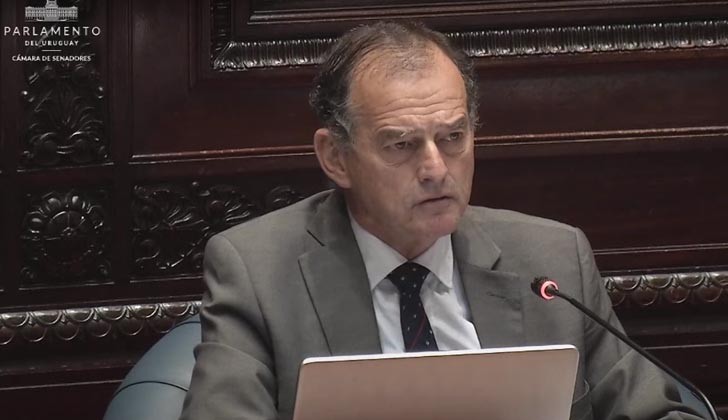
This Wednesday, April 6, the senator and leader of Cabildo Abierto, Guido Manini Ríos, made a presentation in Parliament referring to the 50th anniversary of the declaration of internal war by Parliament, which generated a strong debate among parliamentarians.
“The words that I am going to say next do not seek to deepen differences between Uruguayans, they do not seek to accuse anyone, half a century after the events occurred, they do not seek to blame or absolve any person, organization or party. On the contrary, its purpose is that events of deep historical significance do not go unnoticed,” said Manini Ríos.
He stated that the Senate “should not ignore such facts and should seek to contribute to the” pacification of the spirits of Uruguayans as the only foundation on which to build a free and strong society, capable of facing the challenges that the current world presents.
He referred to two relevant historical events, separated from each other by a century, which must be seen as a whole to extract from them their real historical dimension.
Next April 15 will be the 50th anniversary of the day the General Assembly voted that the country was in a state of internal war. “Much has been said about the so-called ‘recent history’, to which it is practically confined, since the dissolution of the chambers in 1973 and the excesses committed by the dictatorship thereafter, and there has been practically silence about what happened in previous years,” said Manini Ríos.
“Undoubtedly, to have a clear idea of this past, not so recent for us, it is necessary to see the events that occurred as a whole, it is necessary to know the process that led to the institutional rupture. First of all, it is necessary to have the intellectual honesty to accept the facts as they occurred, without attempting to give them a bias to favor current political positions. History must be based on real events and not on functional stories, on organizations and parties that act, half a century later, and above all, history cannot be written at the request of those who, seeking to eternalize the fracture in our society, generously spread resources to keep the fire that burned half a century ago always burning,” he added.
The Cabildo Abierto legislator stated that to understand this period of history, one must go back to the beginning of the 1960s when the then Minister of Cuba Ernesto “Che” Guevara visited our country and on August 17, 1961 said that in Uruguay ” the conditions for a revolution were not given” due to the democratic strength of our country. However, the “influence of the Cuban revolution, triumphant in January 1959, attracted many young people who believed it was possible to replicate the revolutionary process in Uruguay.”
“And this is how they organize themselves militarily, thinking of taking power by force of arms, and begin to carry out violent actions: assault on the Swiss Shooting Club in 1962, we are talking about a decade before the events that we remember today, the attack on the bowling alley in Carrasco, bank and private robberies, kidnappings, murders, kidnappings, murders and threats announcing popular justice before the actions of an insensitive oligarchy that was announced. These are just some of the events that marked that decade, in which Uruguayans lived surprised, fearful and threatened by a bloody escalation,” said Manini Ríos.
He said that “the police forces had to face this criminal action with its historical scarcity of material and human resources, to which was added the ignorance of something new in our country. A criminal organization, formed for the seizure of power.”
He recalled that in 1967, the Latin American Solidarity Organization (OLAS), made up of representatives of different armed groups from the continent and self-defined revolutionary parties, and where the Uruguayan delegation included representatives of the Communist and Socialist parties of Uruguay, met in Havana , “declared the validity of the armed route to access power and the Uruguayan armed organizations received international support to continue their actions.”
He added that it is fair to say that the then general secretary of the PCU, Rodney Arismendi, opposed the approved motion.
“Hundreds of young Uruguayans attended courses in Cuba, as well as in the Soviet Union, information not only disclosed by the democratic authorities of the time, but also confirmed by the organizations involved,” he added.
He stated that the balance of a decade of political violence is “devastating and it is surprising that the current textbooks, in the chapters on recent history, omit to mention it.”
“A hundred people, including dozens of civilians, 33 policemen and 17 soldiers, were killed. Kidnappings, injuries, bank robberies, and private ones, arsenals discovered, release of two hostages in one of the town’s jails where they spent more than a year in subhuman conditions. This was the reality that the country lived in democracy for more than a decade, no one can deny it without rudely lying, ”he remarked.
tragic date
He said that April 14, 1972 “is a tragic date in our history. In the early hours of the morning, the following were assassinated: the former Undersecretary of the Interior, Armando Acosta and Lara; as well as Deputy Commissioner Oscar Delegates; Agent Carlos Leites and Corvette Captain Ernesto Motto. Assassinations that gave rise to the reaction of the Joint Forces, a combination of the Armed and Police Forces created a few months ago to combat the armed organizations in our country, and on the afternoon of that same day they found the death of eight members of the seditious organization ”.
“These bloody events caused a tremendous shock in the Uruguayan people and the feeling that they had gone too far. On the afternoon of that day, the Executive Power sent a bill to the General Assembly requesting the suspension of individual guarantees for 90 days, for the purposes of applying article 31 of the Constitution, and the declaration of a state of war internal, in order to apply article 253 of the Constitution that gave rise to the intervention of the Military Justice in the face of the state of intimidation that the ordinary Justice was in, after a wave of kidnappings and threats suffered by its members,” he indicated.
The session of the General Assembly began at 7:36 p.m. on April 14 and ended more than 20 hours later and was attended by the entire cabinet. “The Colorado deputy Ángel Rat said in his speech that the session that night was ‘particularly serious because 12 people from the East, 12 Uruguayans, had died. The General Assembly meets little less than in a bloodbath that covers the country, it is an ideological contest, a struggle between violence between barbarism and democracy. It is a war, a state of commotion and internal war is being experienced, and the danger to the institutions that terrorist groups represent means that the General Assembly has to take the most logical position in defense of a democratic and pluralist Uruguay,’” Manini Ríos quoted. The suspension of guarantees was approved by 97 votes out of 118 in the General Assembly and would remain in force for 30 days. The National Party’s motion on the state of internal war was also approved.
“When the term expired in the session of April 15, on May 15, a motion of the Colorado Party was approved by 68 out of 124 votes that extended the state of internal war until the sanction of a State Security Law or, failing that, Until June 30th. That day it resolves to extend the internal state of war until July 22. This extension was rendered ineffective when it was approved before the State Security Law, as of July 5, 1972”, he added.
He said that all these facts “contribute to knowing the historical truth and this situation should call for deep reflection, since the essence of democracy lies in recognizing the rights of all, even those who think differently.”
“We really believe that it is necessary to look forward as a country and leave behind that past of confrontation and that spirit must be based on the knowledge of our real history, devoid of the passions that are lived half a century later. An objective look at the past, that does not hide and distort the facts, that does not transform into heroes those who attacked democracy and that recognizes those who gave or risked their lives to defend society from that aggression”, he commented.
He assured that the events of April 1972 were the culmination of a decade of bloody events that shocked the peaceful life of Uruguayans.
Meanwhile, he assured that “he does not accept” that the story be simplified to a stage with two actors, that is, the aggressors of democracy and those who defended it, because the vast majority of Uruguayans are left out as “simple spectators”. .
In this situation there were “many actors, and external internal ones, who bet or provoked or allowed this constitutional deterioration. Sometimes with the intention of making a profit or because of the notorious disability”. He added that “there were actors who were never pointed the finger and they bear responsibility.”
“The mutilated story that is told only for the use and benefit of certain groups should not make us forget that this decision to declare an internal state of war to provide the necessary legal framework for the defense of the country against the deliberate attack against our institutions was declared by a democratic Parliament elected a few months earlier in extremely free elections”, he said.
So that current generations can better understand how the events occurred “a century and a half ago on April 6, 1872, the so-called April Peace was signed, which put an end to the Revolution of the Lances, an armed movement led by the legendary Floridian white caudillo Timoteo Aparicio against the government of General Loreanzo Batlle that day the easterners decided to look forward, through an agreement in which the two belligerent parties decided to co-participate in public leadership. Gone are the times of hatred and division in the face of the interests of the country.”
He added that after half a century, and a century and a half of such significant events in our history, it is time to reflect deeply and take the necessary steps to overcome the misunderstandings of the past, putting the true interest of the country first.
“That is what the current and future generations of Uruguayans demand and what a political system must look for that is up to the times we live in. That we Uruguayans resolve our problems again without the interference of interests that are served by the state of fragmentation that feeds into the most diverse aspects of our people’s lives”, he stated.






